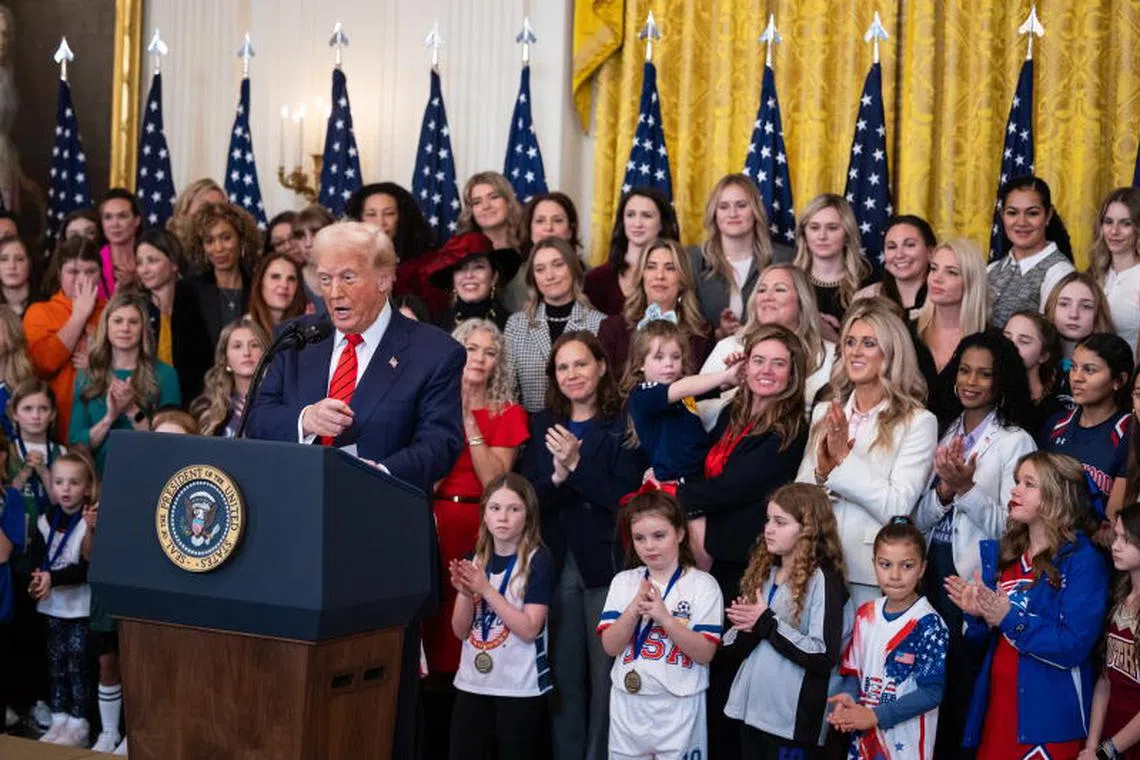Donald Trump’s ban on transgender sports may be difficult to enforce
Sign up now: Get the biggest sports news in your inbox

US President Donald Trump speaks during an event before signing an executive order related to transgender athletes in women's sports.
PHOTO: EPA-EFE
NEW YORK – President Donald Trump’s executive order restricting transgender women and girls from playing in female sports offers little guidance on enforcing the ban beyond looking into the “best practices” of those states with similar laws, which have mostly proven limited or impractical.
Current options for enforcing the ban range from looking at birth certificates, which can be altered, to inspecting the bodies of children, an alternative that most would find unpalatable at best.
“Anti-trans school sports bans are difficult to enforce because they rely on sex testing and body policing for implementation and enforcement,” said Chris Mosier, a transgender athlete and founder of transathlete.com, a website on school policies related to transgender athletes.
The issue is one that sports associations, schools and states have wrestled with for decades, with so-called “naked parades” and gynaecological exams used to confirm sex for some events in the 1960s, though those methods were later abandoned.
Of the 25 states that have laws resembling Mr Trump’s new order, only 12 specify a procedure for determining a student’s sex.
In most cases, it involves checking birth certificates, according to the Movement Advancement Project, a think tank that advocates for transgender rights.
Other states look to affidavits from parents, students or healthcare providers.
“An increased scrutiny on athletes’ bodies creates serious harm to all women and girls who are perceived as ‘more masculine’ due to being queer, intersex, or otherwise out of alignment with narrow, white-centric norms of femininity,” said Mosier.
In 2020, Idaho became the first state to pass a law prohibiting transgender women and girls from playing in female-designated sports teams, mandating that a student whose sex was in dispute would have to provide a health exam and consent form from a healthcare provider.
The healthcare provider could verify the student’s sex by relying on their genetic make-up, reproductive anatomy or naturally produced testosterone levels, according to the law, which has since been blocked by the 9th US Circuit Court of Appeals.
A transgender woman, Lindsay Hecox, sued to block the law after she would not qualify to join the female track team at Boise State University due to the tests for biological sex.
But for at least some of those who support the President’s order, the message it sends is powerful and overdue, regardless of any issues over enforcement that may surface.
“The executive order... is important legally but also vital for the long-overdue message it sends to women and girls: your rights matter,” said Kristen Waggoner, chief executive and president of Alliance Defending Freedom, which describes itself as a conservative Christian legal advocacy group.
In related news, Harvard University was sued by three former University of Pennsylvania female swimmers who claim they were discriminated against when a transgender teammate beat them at the Ivy League championships in 2022.
The federal lawsuit filed on Feb 4 claims that Harvard, Penn, the National Collegiate Athletic Association and the Ivy League violated federal law by allowing Lia Thomas, a “trans-identifying male swimmer”, to compete.
Harvard was named as a defendant because it hosted the 2022 Ivy League championships on its campus.
Thomas, who swam for Penn’s women’s team, won the 500- and 200-yard freestyle races, setting league records in the process.
REUTERS, BLOOMBERG


